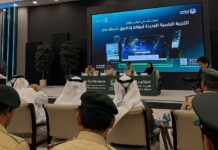Gulf News gets exclusive access into a private hospital’s COVID-19 ward
Dubai: In view of the raging coronavirus (COVID-19) pandemic, it is quite natural for people to believe that any patient who ends up in a hospital’s intensive care unit (ICU) is on the brink of death.
But it was quite a different story when the Gulf News team went inside the ICU of Al Zahra Hospital (AZH) in Sharjah on Wednesday. We were greeted by a smiling COVID-19 patient, who was previously sedated and intubated for 20 days, and a courageous and energetic doctor who meticulously explained how several patients had recovered and still others were in the process of recovering from the dreaded infection.
We were also welcomed by a team of specially trained health-care professionals, who did not only rely on their sophisticated monitoring equipment, but also drew strength from each other and their abilities in ensuring patient-care.
There were eight patients, mostly male, of different age groups in the ICU, all intubated in their throats for ventilator support, to help air move in and out of their lungs. However, Wilfredo, 46, was the exception since his tube had been removed a couple of days ago.
Sharing his personal experience, Wilfredo, a Filipino expatriate, said that being on a ventilator was not like what he had read or heard earlier.
“I thought I was on ventilator for only one day,” he said. “After I opened my eyes, my doctor asked me how I was and to my surprise I learnt that I was asleep for 20 days,” he said in glee.
Wilfredo first exhibited symptoms on March 27 and after two days he was admitted to the hospital. His fever was high and his coughing got severe. He even struggled taking a few steps, going to the bathroom, because of lack of oxygen and difficulty in breathing.
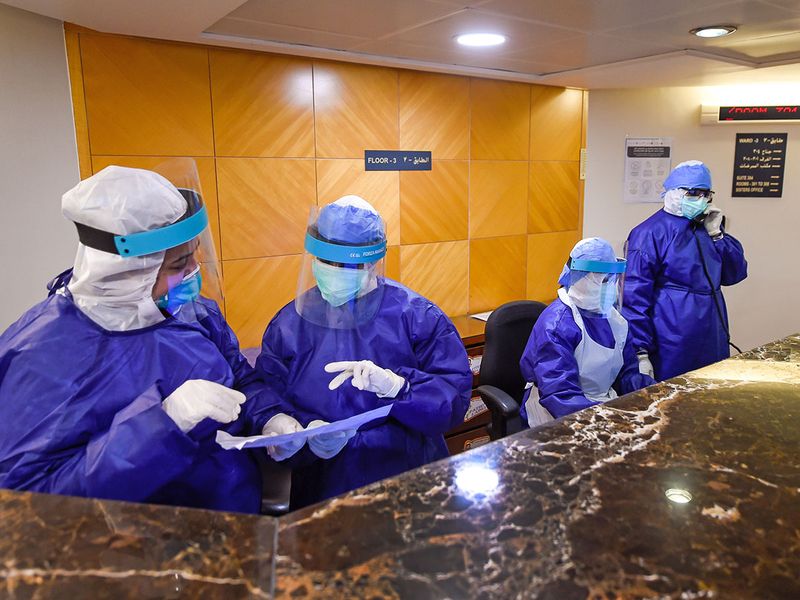
He was admitted to the ICU, sedated and intubated to reduce stress and oxygen consumption as well as improve his breathing with mechanical ventilation. Wilfredo was aware he was fighting for his life, but he said he was also confident he would win the fight.
“I prayed hard to God and placed my trust in the medical team. Now, I’m getting better everyday and could only remember those weeks on ventilator like it was yesterday,” he added.
Wilfredo will soon be placed in a step-down unit or a regular ward, where he will still be closely monitored and tested for coronavirus before being discharged and sent home.
It was his immune system and the collective effort of front-line medical staff members that made him win the battle, he added.
Hardworking and courageous force
In the battle against COVID-19, the main protagonists are the front-line medical workers who take the virus by its horns, day in and day out.
The general mood in the ICU was not one of chaos or fear. Two staff members in personal protective equipment (PPE) were stationed at the reception, while nurses in full PPE were doing the rounds and checking medical charts.
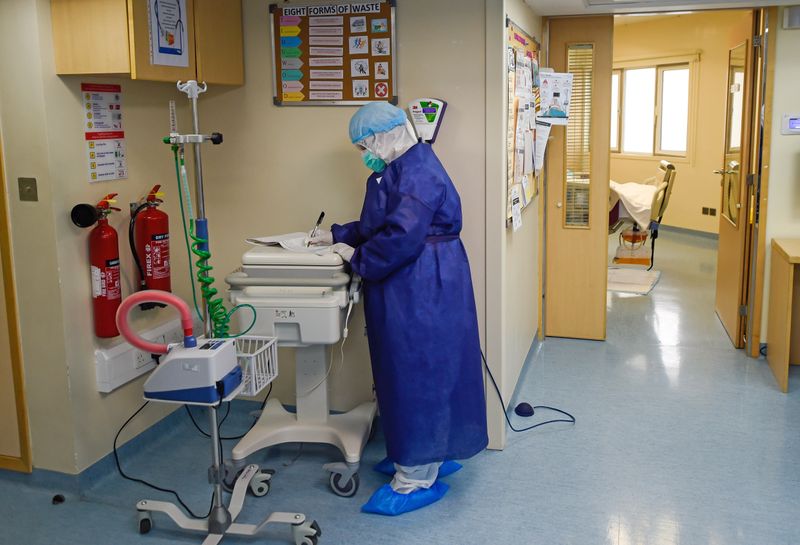
Dr Hazem Daaji, consultant anaesthesiologist and chief medical officer, was also present to check on the patients.
“The medical staff at AZH, like all medical workers in the world, are hailed as heroes, but they are also humans – they also live in fear,” Dr Daaji said.
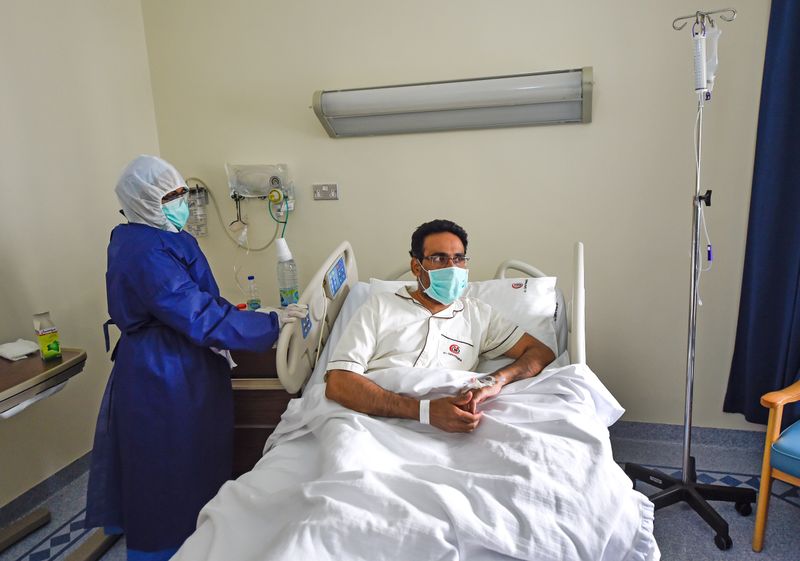
“When we had our first COVID patient back in end-February, we panicked. Theoretically, we were prepared – we got proper advice from the health authorities – but after Patient 1 arrived, we also panicked. We did not have prior experience to treat a COVID patient,” Dr Daaji explained.
“Then more patients arrived. They have tested positive with symptoms ranging from zero to critical,” he said, adding that the medical staff had been working for longer hours to cope with the crisis.
At the onset of the pandemic, Dr Daaji said he saw nurses crying at the end of their work shifts. “They were afraid that they would take the virus back home. Some doctors even chose to stay at home,” he said.
“As a team leader, I had to keep our morale high. I came to work every day and showed our staff we had to take care of all patients. There was no other way – we are medical staff who went to school to help people and now we are putting ourselves at risk, but we have a duty,” he added.
Dr Daaji said, at the moment, they have 80 patients, including eight in the ICU. But many have already recovered, including Patient 1, who initially became critical and was placed in ICU. The patient recovered after two weeks and is now back with his family.
“COVID-19 is a flu virus and not a death sentence. More people die everyday because of other health-related issues. The only problem, however, with coronavirus is that within a short period of time, a lot of peole have been infected and hospitals are overloaded,” Dr Daaji said.
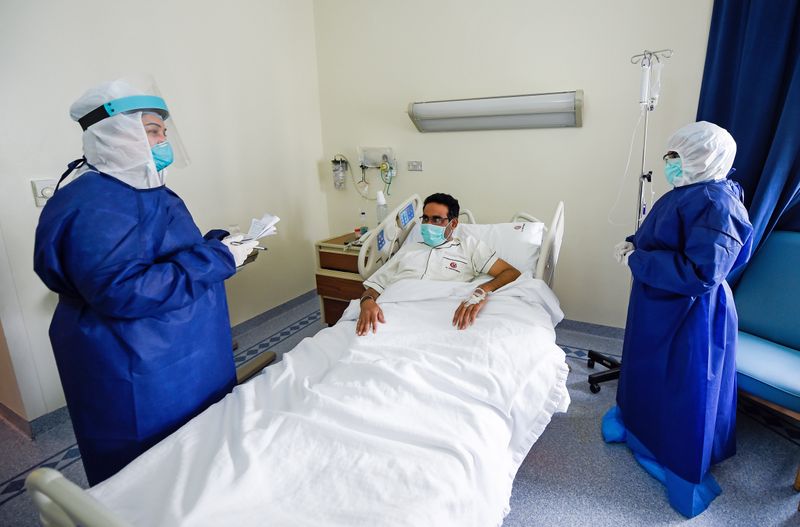
“In my opinion, in two or three months we will survive this pandemic and we will go on with our lives. Once this is over, I will throw a big party for all the staff to appreciate their patience and hard work,” he concluded.
How nursing staff members handle patients
Chief nursing officer Shazia Amin and her team of nurses at the hospital feel they are not just tending to COVID-19 patients, providing the best medical care, but are serving the community.
“We feel honoured being of service to the community in this exceptionally difficult time,” she said.
“It is a challenging time for health-care professionals as we have no time to think about ourselves. Safety is our goal and we are leaving no stone unturned,” she added.
Amin said she and her team were well-acquainted with the disaster and emergency management.
She said her team’s expertise includes disaster preparedness and response, resilience after a disaster, dealing with disaster epidemiology and other areas.
“Nurses play a very important role. We are not there just to treat patients – but also to talk to them and comfort them about the situation. As nurses, we are able to see what is working, as well as things that can be done differently to provide more effective and efficient care, and offer suggestions for improvement.”
Ask sister Bharati Venkat and sister Lincy Sebastian how they are coping with such a crisis in hand – they are as calm about tackling the danger as it can get.
“It was hard initially coping with the situation. There were so many unanswered questions. But the awareness about the virus is higher and it helps us deal with the situation far better. Thanks to the efforts of Dubai Health Authority (DHA), we are combating COVID-19 in a big way.”
Take caution, avoid risk
COVID-19 is not a death sentence, as Father Styphen Lewis in the isolation ward said. But don’t ignore the symptoms and don’t ignore personal care to avoid risk of contracting the infection, he cautioned.
Fr Lewis, 46, assistant parish priest at St Michael’s Church in Sharjah, who had tested positive for COVID-19 on April 20, cautioned people to take the virus seriously and do everything they can to follow safe practices in order to avoid contracting the infection. “It is not a virus to be fooled around with,” he warned.
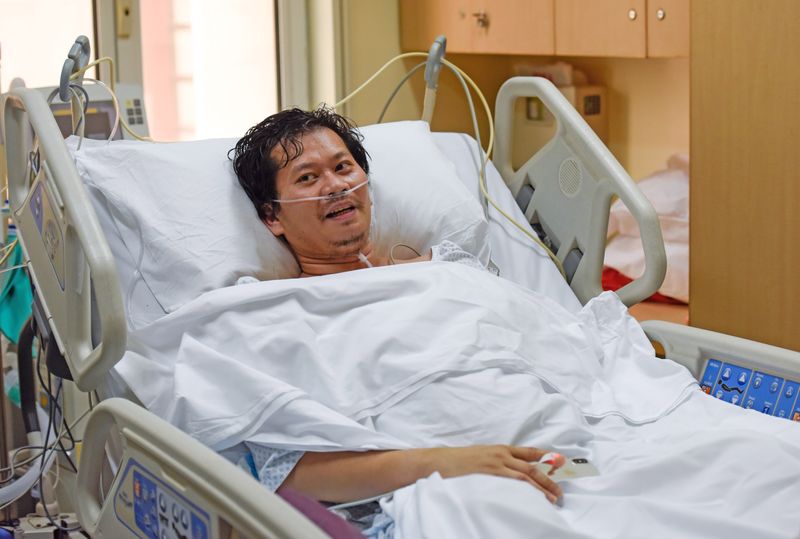
“There is no sure treatment and all medication is given based on the symptoms. There is also the risk of contracting the virus once again even after you come out of it. So build a good immunity and be responsible in taking care of yourself.”
Fr Lewis had been suffering from fever, cough and diarrhoea, for five days prior to being admitted to the hospital. “I now feel okay, except for some weakness. But hopefully, I will go home soon.”
Fr Lewis had previously dealt with malaria while he was in Africa. “If I had to compare the two – I would say there is so much fear attached to COVID-19. It is not an easy infection to deal with.”
Why journalists went inside a COVID ICU?
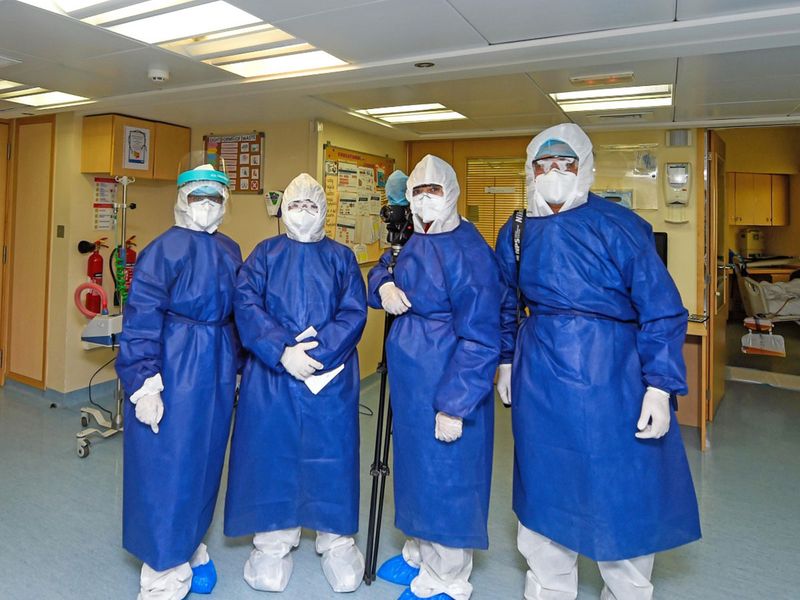
Yes, we are just doing our job. But beyond the numbers and statistics, we also had to report on how frontliners risk their lives to save others. We had to meet them in person and see how they go about doing their duties first-hand. We also had to listen to and share the stories of hope and recovery of the patients.


